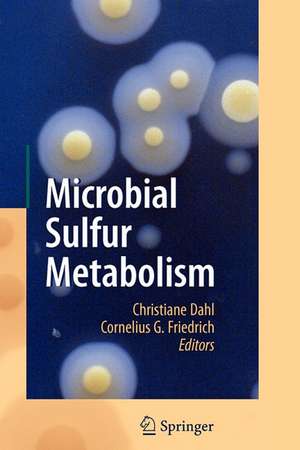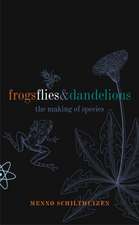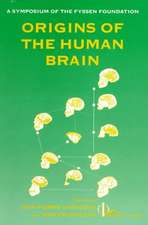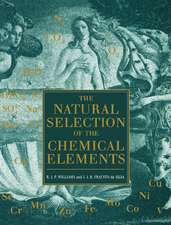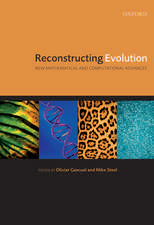Microbial Sulfur Metabolism
Editat de Christiane Dahl, Cornelius G. Friedrichen Limba Engleză Paperback – 15 oct 2010
| Toate formatele și edițiile | Preț | Express |
|---|---|---|
| Paperback (1) | 1218.53 lei 6-8 săpt. | |
| Springer Berlin, Heidelberg – 15 oct 2010 | 1218.53 lei 6-8 săpt. | |
| Hardback (1) | 1224.54 lei 6-8 săpt. | |
| Springer Berlin, Heidelberg – 26 sep 2007 | 1224.54 lei 6-8 săpt. |
Preț: 1218.53 lei
Preț vechi: 1486.00 lei
-18% Nou
Puncte Express: 1828
Preț estimativ în valută:
233.19€ • 243.15$ • 193.81£
233.19€ • 243.15$ • 193.81£
Carte tipărită la comandă
Livrare economică 21 martie-04 aprilie
Preluare comenzi: 021 569.72.76
Specificații
ISBN-13: 9783642091735
ISBN-10: 3642091733
Pagini: 332
Ilustrații: XXII, 308 p.
Dimensiuni: 155 x 235 x 17 mm
Greutate: 0.47 kg
Ediția:Softcover reprint of hardcover 1st ed. 2008
Editura: Springer Berlin, Heidelberg
Colecția Springer
Locul publicării:Berlin, Heidelberg, Germany
ISBN-10: 3642091733
Pagini: 332
Ilustrații: XXII, 308 p.
Dimensiuni: 155 x 235 x 17 mm
Greutate: 0.47 kg
Ediția:Softcover reprint of hardcover 1st ed. 2008
Editura: Springer Berlin, Heidelberg
Colecția Springer
Locul publicării:Berlin, Heidelberg, Germany
Public țintă
ResearchCuprins
Genetics and Genomics of Sulfate Respiration in Desulfovibrio.- Living on Sulfate: Three-Dimensional Structure and Spectroscopy of Adenosine 5´-Phosphosulfate Reductase and Dissimilatory Sulfite Reductase.- Respiratory Membrane Complexes of Desulfovibrio.- Biochemical and Evolutionary Aspects of Eukaryotes That Inhabit Sulfidic Environments.- Evolution and Ecology of Microbes Dissimilating Sulfur Compounds: Insights from Siroheme Sulfite Reductases.- Genomic and Evolutionary Perspectives on Sulfur Metabolism in Green Sulfur Bacteria.- Differential-Expression Proteomics for the Study of Sulfur Metabolism in the Chemolithoautotrophic Acidithiobacillus ferrooxidans.- Sulfur and Light? History and “Thiology” of the Phototrophic Sulfur Bacteria.- Thiosulfate and Sulfur Oxidation in Purple Sulfur Bacteria.- Sulfur Oxidation in Chlorobium tepidum (syn. Chlorobaculum tepidum): Genetic and Proteomic Analyses.- Structural Insights into Component SoxY of the Thiosulfate-Oxidizing Multienzyme System of Chlorobaculum thiosulfatiphilum.- Redox Control of Chemotrophic Sulfur Oxidation of Paracoccus pantotrophus.- Bacterial Sulfite-Oxidizing Enzymes – Enzymes for Chemolithotrophs Only?.- Sulfonates and Organotrophic Sulfite Metabolism.- Oxidation of Sulfur and Inorganic Sulfur Compounds in Acidianus ambivalens.- A Novel Coenzyme F420 Dependent Sulfite Reductase and a Small Sulfite Reductase in Methanogenic Archaea.- Archaeal and Bacterial Sulfur Oxygenase-Reductases: Genetic Diversity and Physiological Function.- Diversity of Halophilic Sulfur-Oxidizing Bacteria in Hypersaline Habitats.- Sulfur Oxidation at Deep-Sea Hydrothermal Vents.- Speciation Analysis of Microbiologically Produced Sulfur by X-ray Absorption Near Edge Structure Spectroscopy.- Controls on IsotopeFractionation During Dissimilatory Sulfate Reduction.- Bioprocess Engineering of Sulfate Reduction for Environmental Technology.- Impact of Nitrate on the Sulfur Cycle in Oil Fields.
Textul de pe ultima copertă
In nature, sulfur occurs in many different oxidation states and is one of the most versatile elements in life. It is an integral part of many important cell constituents, such as the amino acids cysteine and methionine, and many sulfur compounds serve as the basis for energy-related processes in prokaryotes. In recent years, new methods have been applied to study the biochemistry and molecular biology of reactions of the global sulfur cycle, the microorganisms involved and their physiology, metabolism and ecology. These activities have uncovered fascinating new insights for the understanding of aerobic and anaerobic sulfur metabolism.
Caracteristici
Includes supplementary material: sn.pub/extras
